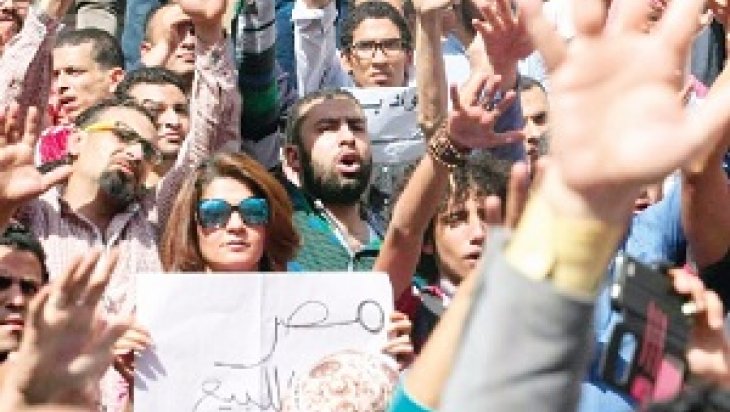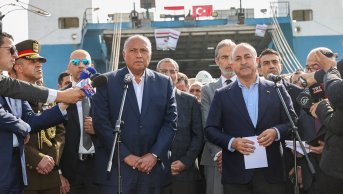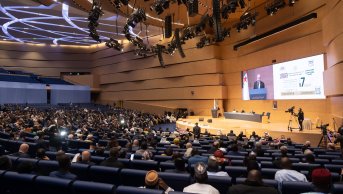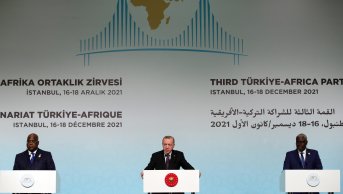Understanding Al-Sisi’s Western-backed “oppression policy”

Last month, 762 armored military vehicles that the US military granted in order to “support the fight against terrorism in Egypt” has reached Alexandra Port. This assistance shows that the USA will give any support to the Sisi regime in Egypt especially on the condition that it will not pose any threat to Israel.
Increasingly more strata of society react against Abdel Fattah al-Sisi who came to power upon military coup in Egypt. The oppression of al-Sisi regime is not restricted only on Muslim Brotherhood but also on the people who do not have connections with any political group. This reveals that oppressive policies will continue to be practiced at the highest level in the country.Lastly, it is also important that number of press members who supported al-Sisi during the military coup in 2013, clearly indicated that they felt uncomfortable after the raid on Journalists’ Syndicate.
Last week, Egyptian police launched a raid on Journalists’ Syndicate in Cairo and arrested two press members, which caused an unmanageable crisis for al-Sisi regime. After the raid, union members and several independent journalists participated in the demonstrations and wrote critical reviews about al-Sisi government in some of the leading newspapers.Having been witnessed for the first time in the post-coup period, this situation can show that there are increasingly more people who are critical of al-Sisi and this opposition is now spreading to different groups of the society.
Recent actions of al-Sisi government against the opposition prove that the regime has paranoia. This was clearly the case when the regime arrested five young people who uploaded a video on Facebook. Five friends who are members of the Street Children movement humorously criticized the President Abdel Fattah al-Sisi and were arrested and taken into custody by the security forces. In a very short span of time the video was widely circulated and thousands of Egyptians shared the video. After the news about their arrest appeared on the media many people send supportive messages of the group. The arrest created reactions on the social media and many social media users including writers, actors and human rights defenders launched a campaign so that the young people in custody could be released. Despite the reactions, the prosecution office extended their period of detention since they are tried on the crimes of “inciting terrorist acts and street protests, attempting to overthrow the regime and degrading the public institutions”. This can show that the Egyptian regimewill continue targeting even the most innocent opposition groups.
Al-Sisi’s oppressive regime and Western approach
What primarily encourages and motivates al-Sisi regime to continue its oppression in the country on such a high level is the silence of the Western actors who are not critical of al-Sisi. Even though reactions are sometimes shown at institutional level for certain events in the country, there is no sanction on or qualified reaction to al-Sisi government.
Its clearest-cut example is seen in the US policy towards Egypt. US Secretary of State issued a press statement on May 3 about the raid on Egyptian Journalists’ Syndicate and called the Egyptian government to respect the freedom of expression. In another statement made on May 10, the spokesperson of the US Secretary of State Elizabeth Trudeau expressed her concerns about two journalists of Al Jazeera (Arabic) in Egypt who were sentenced to death. Having previously made similar statements in certain situations, the US officials were unable to go beyond warning the Egyptian government.
Washington also continued to send military assistance to Egypt despite all these statements and reactions. In the post-coup period in 2014, 23% of the military assistance provided by the USA was allocated to Egypt. The military assistance provided to this country surpassed the total amount of the assistance that the USA delivered to 73 countries in this field. The military assistance continued in 2015 and 2016within this framework. The US government supplied two fast intervention boats to Egypt in June 2015, eight F-16 war planes in August and 4 F-16 war planes in October. Lastly, 762 armored military vehicles that the US military granted in order to “support the fight against terrorism in Egypt” has reached Alexandra Port in the last days. This assistance shows that the USA will give any support to the al-Sisi regime in Egypt especially on the condition that it will not pose any threat to Israel.
A similar situation is observed in the EU policy towards Egypt. Frequently warning Egypt against the human rights violation and reacting in this sense, the European Union is seen to adopt an indecisive attitude concerning its political engagement with Egypt both as on institutional and state levels. European Parliament published a communique on May 8 about the murder of Italian doctoral student Giulio Regeni who was tortured to death in Egypt. In this communique, the human rights violation in Egypt was emphasized and all EU member states were called to suspend their cooperation with Egypt in the field of security. However, it is seen that the EU member states did not pay attention to the decisions made on institutional level and continued their bilateral relations with Egypt.
Just couple of days later of the EU’s communiqué for Egypt, on May 11, Greek and Egyptian armies conducted a joint military exercise in the Mediterranean Sea. It is also seen that another EU member France has still been maintaining its military agreements with Egypt. Three of the 24 Rafale jets that France sold to Egypt was delivered to Cairo in January 2016 while the first Mistral warship that was sold to this country named as Gamal Abdel Nasser and was launched to the sea in May 2016. On April 18, French President François Hollande paid an official visit to Egypt and concluded 14 separate agreements between the two countries. Germany also maintains its security cooperation with Egypt. Berlin announced that two submarines that were sold to Egypt last year would be soon delivered. All these developments show that the EU countries follow a different line even though they show reactions to Egypt on discourse level.
Increasing unrest in the Gulf
Finally, it is necessary to underline that al-Sisi government gradually loses its credit within the eyes of the Gulf governments thatunconditionally supported it following the military coup. Indeed, al-Sisi regime has become an increasingly more serious “burden” especially for Saudi Arabia and causes unrest in Riyadh. Saudi government which had provided billions of dollars to Egypt since the military coup reclaimed Tiran and Sanafir islands in the Red Sea in April and showed its determination to for a return of its past aids to Egypt. With falling oil prices, the Saudi government started to have economic concerns for the first time and hesitate to support al-Sisiregime. As a sign of this attitude, it is now observed that the media organs based in Saudi Arabia that did not previously direct slightest criticism to al-Sisi regime now started to voice harsh criticismagainst the government in Cairo.
Furthermore, the Egyptian issue has caused serious unrest in terms of “strategic alliance” between Saudi Arabia and Turkey especially in the last months. Efforts have so far been made in vain to convince two countries to sit at the same table again. This may lead Saudi Arabia (which has a qualified alliance with Turkey in terms of two vital issues: Iran and Syria) to consider the possibility to sacrifice al-Sisi government in Egypt.











